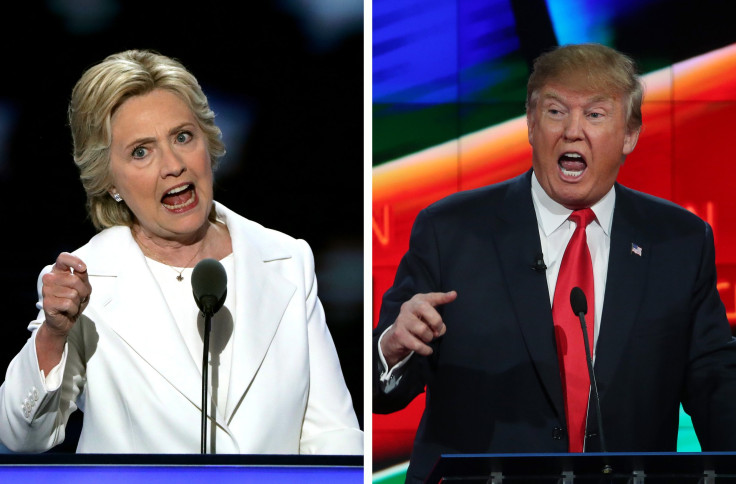Who Makes Up The Commission On Presidential Debates? Elite Group Decides Schedule, Moderators And Candidates

Every four years a select group of fewer than 20 people makes just about every decision about the U.S. presidential debates, from the schedule to how candidates qualify. That gives them an enormous amount of power over the country's elections, but most Americans have no idea who they are.
Since 1987, the Commission on Presidential Debates, or the CPD, has been the governing body in charge of organizing the presidential and vice presidential debates every election cycle. The organization put together Monday's highly anticipated showdown between Democratic nominee Hillary Clinton and GOP nominee Donald Trump and its stated purpose is to ensure voters get the opportunity to view an informative debate, but little is known about how the commission operates behind the scenes.
The Commission On Presidential Debates board is currently chaired by Frank J. Fahrenkopf Jr. and Michael D. McCurry. Fahrenkopf is a former chairman for the Republican National Committee and McCurry was press secretary under President Bill Clinton. The other board members are:
- Howard G. Buffett — chairman and CEO of The Howard G. Buffett Foundation
- John C. Danforth — former U.S. senator
- Mitchell E. Daniels Jr. — president of Purdue University
- Charles Gibson — former anchor at ABC World News
- John Griffen — managing director of Allen & Co. LLC
- Jane Harman — director, president and CEO of Woodrow Wilson International Center for Scholars
- Antonia Hernandez — president and CEO of California Community Foundation
- The Rev. John I. Jenkins — president of the University of Notre Dame
- Jim Lehrer — former executive editor and anchor of "NewsHour" on PBS
- Newton N. Minow — senior counsel at Sidley Austin LLP and former head of the Federal Communications Commission under President John F. Kennedy
- Richard D. Parsons — senior adviser of Providence Equity Partners LLC
- Dorothy S. Ridings — former president of the League of Women Voters and former president and CEO of the Council on Foundations
- Olympia Snowe — former U.S. senator
- Shirley M. Tilghman — former president of Princeton University
After the famed John F. Kennedy- Richard Nixon debates in 1960, the first presidential debates to be televised, there were no more televised presidential debates until the 1976 election cycle. However, though there were debates in the 1976, 1980 and 1984 elections, they were hastily organized, with some candidates not agreeing to terms until the last minute, much like the way Trump threatened to and, in some cases did, back out of Republican primary debates in this election cycle.
The Commission On Presidential Debates was created to ensure the presidential debates were well regulated and organized months in advance so the public could be guaranteed to see a debate among the relevant candidates. The organization was formed in 1987 after studies by the Georgetown University Center for Strategic and International Studies and the Harvard University Institute of Politics concluded debates between the leading candidates for president should become a regular part of U.S. elections.
Though co-chairs Fahrenkopf and McCurry both have ties to the two major party candidates this year — Fahrenkopf as a former Republican National Committee chair and McCurry as part of the Bill Clinton administration, and Paul Kirk, a former chair of the Democratic National Committee — the Commission On Presidential Debates maintains it is not beholden to the interests of the major parties. The Commission On Presidential Debates receives no funding from the government or any political party, political action committee or candidate, according to the organization's website. It is a nonprofit organization.
Some have suggested otherwise. This year's Libertarian party nominee Gary Johnson criticized the Commission On Presidential Debates for excluding him from Monday's first debate. The Commission On Presidential Debates mandates a candidate average 15 percent in the major polls to qualify for a spot on the debate stage. Johnson, who has been hovering at 10 percent in the polls, says the rules favor the major party candidates.
“I would say I am surprised that the CPD has chosen to exclude me from the first debate, but I’m not," Johnson said after the Commission On Presidential Debates announced that he and Green Party nominee Jill Stein had failed to make the cut. "After all, the commission is a private organization created 30 years ago by the Republican and Democratic parties for the clear purpose of taking control of the only nationally televised presidential debates voters will see."
The Commission On Presidential Debates maintains that the 15 percent mark is a fair one to insure inclusivity, but not to the point of "jeopardizing the voter education purposes of the debates" by including candidates with only minimal national support. Third party candidates have consistently argued this is a catch-22: How could they gain more support if not given a chance for voters to see how they stack up against the major party candidates.
The Commission On Presidential Debates's control over who participates in the presidential debates also extends to the moderators. The board uses three criteria to select its moderators: familiarity with the candidates and the major issues of the presidential campaign, extensive experience in live television broadcast news, and an understanding the debate should focus maximum time and attention on the candidates and their views. While the Commission On Presidential Debates selects the moderators, it does not decide what the moderators choose to ask the candidates.
NBC News anchor Lester Holt will moderate the first debate at Hofstra University in Hempstead, New York. The debate will be broadcast live at 8 p.m. EDT on all major broadcast news networks and cable news networks.
© Copyright IBTimes 2024. All rights reserved.






















